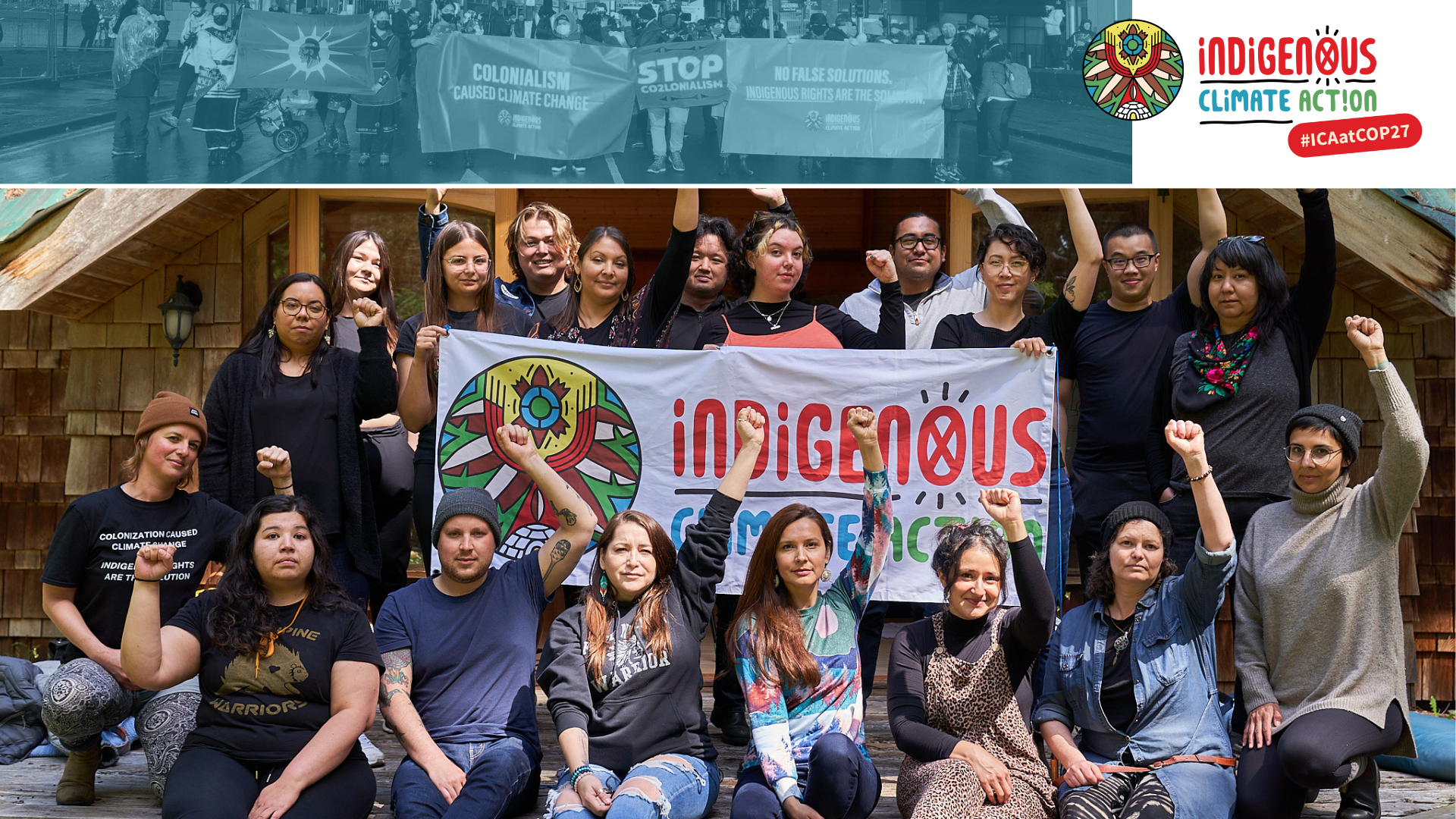ICA Policy Objectives for COP27
As a pillar of colonialism capitalist economies have caused immense and wide scale harm to Indigenous Peoples and Lands. Capitalism is a system which demands constant increases in production and expansion without consideration for the life of the lands, waters, animals, and plants who sustain us. Climate financing schemes arising out of Article 6 of the Paris Agreement maintain the capitalist systems that sit at the heart of the climate crisis and will continue to perpetuate the wide scale destruction of people and the planet.
Based on ICA’s findings in Phase 1 of our report on Decolonizing Climate Policy in Canada, climate policies put forward by colonial states have consistently failed to respect the rights of Indigenous Peoples and Nations. This has led to ineffective policies that do not address the climate crisis, nor reduce global greenhouse gas emissions. Without centering the leadership of sovereign Indigenous Peoples and Nations climate policies fundamentally fail to both understand and address the root causes of climate change. As Indigenous Peoples and Nations, we understand that true climate solutions are rooted in the restoration of our relationships with the natural world around us. These are the perspectives that have informed ICA’s key policy positions for COP27.
Climate Reparations
Globalized systems of oppression like colonialism and capitalism have facilitated the exploitation of peoples and lands worldwide. Not only has this directly contributed to the scale of the climate crisis, but these systems of oppression have also exacerbated the effects of climate change experienced by Black, Indigenous, and People of Colour. Climate reparations are a necessary first step to address the ongoing legacies of systemic oppression which continue to impact and shape the lived experiences and realities of Black, Indigenous, and People of Colour.
Establishing another flawed colonial finance mechanism will not address the historical injustices which have led to the climate crisis. Nor will it lead to the type of transformative change that is necessary to survive the changing climate. This is particularly the case for those who have endured intergenerational systems of oppression. To ensure that Black, Indigenous, and People of Colour do not continue to bear the brunt of climate change, climate reparations through the form of radically reimagined and redistributed resources is critical.
Key policy positions:
1 (a) Genocide against Indigenous peoples is at the core of the colonial expansion which facilitated extractive practices worldwide. State and non-state actors who have and continue to unjustly benefit from the theft of Indigenous lands have a responsibility to provide reparations for what they have gained from the global genocide of Indigenous peoples.
1 (b) State and non-state actors who have unjustly benefited from enslavement practices have a responsibility to provide reparations to those who have been removed from their ancestral territories for the purpose of capitalist growth and exploitation.
Loss and Damage
Financing will not solve the climate crisis, as market mechanisms continue to maintain the capitalist status quo driving climate change. Further, financing risks exacerbating inequalities for those who experience systemic oppression. For example, loss and damage financing schemes risk further entrenching the Global South within institutional poverty, as has been seen through the International Monetary Fund and structural adjustment programs. Additionally, there is limited capacity for consideration of Black and Indigenous communities living in the Global North who experience conditions of underdevelopment and poverty similar to that in the Global South and who may need access to loss and damage funding.
While there are risks with loss and damage mechanisms, it is necessary to establish a grievance mechanism for loss and damage to meet the immediate needs of communities directly facing the effects of climate change.
Key policy positions:
2 (a) State actors must decolonize their approaches to loss and damage grievance mechanisms to ensure the security of those directly affected by climate change. This includes the eradication of bureaucratic and paternalistic practices often associated with such mechanisms.
2 (b) Non-state actors who benefit from the exploitation of Indigenous Peoples and Lands have a responsibility to provide restitution to those they have harmed through justice mechanisms defined and led by Indigenous Peoples.
Just Transition
A Just Transition requires a paradigm shift rooted in justice and respect for all beings. This requires more than a transition to a ‘green’ economy, rather it must be a transition of how we understand ourselves in relation to the natural world around us. Globalized systems of oppression have manifested on the land just as they have in human societies.
A Just Transition means centering justice as we collectively transition out of the exploitative systems of colonialism, capitalism, patriarchy, and white supremacy. A Just Transition recognizes the need for furthering the transformation of education systems and training to focus on holistic understandings of livelihoods which emphasize the wellbeing of humans and our non-human relations.
According to parliamentary reports from 2022 the Government of Canada is not prepared to support a Just Transition. Currently there is no federal implementation plan, no determined governance system, and no mechanisms for tracking or monitoring. This affirms calls for the recognition and respect of Indigenous sovereignty in so-called Canada as it is clear that the Government of Canada is not prepared to support a Just Transition.
Key policy positions:
3 (a) Colonialism oppresses Indigenous Peoples and Lands. Without the restoration of Indigenous sovereignty and leadership there can be no Just Transition.
3 (b) Global capitalism relies on the exploitation of human beings, the land, animals, plants, and waters. A Just Transition must include a transition away from exploitative capitalist relationships and should center a restorative approach to organizing our economies.
3 (c) Patriarchy and all forms of gendered oppression must be abolished, recognizing that the practice of consent and reciprocity must be central in all our relationships.
3 (d) The logic of white supremacy is at the core of the carceral state which disproportionately impacts Black and Brown bodies, including the targeting of Indigenous Land Defenders.
No False Solutions
In recognizing that not all actors are supportive of a Just Transition – as many individuals and institutions benefit and profit from the status quo – it is anticipated there will be significant discourse around false solutions at COP27. Carbon markets and other nature based solutions are land theft repackaged, and there is a strong need to push back against false solutions and other greenwashing narratives supported by state and industry actors.
Key policy positions:
4 (a) True climate solutions challenge the status quo and will center Indigenous sovereignty and leadership through Indigenous-led climate solutions. ‘Solutions’ that maintain systems of oppression are not solutions.
4 (b) State and non-state actors ought to act with humility and practice honesty regarding climate solutions, and be held accountable through justice mechanisms defined and led by Indigenous Peoples.
Solidarity with the Global South
through Human Rights and Indigenous Rights
Despite the reality that states are the chief violators of human rights, human rights have largely been co-opted by the state. The history and legacy of human rights as a universal call of the globally oppressed has been reduced to sets of lists in treaties and legislation, never materializing in a better world for those who have endured oppression.
Often NGOs work to maintain this system by acting as gatekeepers of advocacy and have contributed to top-down and bottom-up dichotomies of organizing that maintain hierarchical modes of thinking. Indigenous rights are critical for disrupting these systems as they center fluid and holistic understandings of being and organizing.
Key policy positions:
5 (a) It is imperative to remember and honour the radical roots of human rights. Globally we must acknowledge that human rights can and must exist outside of oppressive state structures.
5 (b) Uplifting Indigneous rights means uplifting the rights of all living beings and moving beyond anthropocentric understandings of human beings within the natural world.
5 (c) Global solidarity of oppressed peoples, including a convergence for human rights movements and Indigenous rights movements, is necessary for effective climate action.
Indigenous Sovereignty is the Solution
As a body arising out of the UNFCCC, all solutions within the COP27 space will be inherently limited by the UN system’s reliance on state sovereignty. Article 2.1 of the UN Charter, the founding document of the UN, affirms that the UN is based on the principle of sovereign equality of its member states.
Indigenous sovereignty exists outside and independent of states. Indigenous sovereignty is the only climate solution that will create and maintain the kind of change we need to not only survive the climate crisis but to ensure the wellbeing of future generations.
Key policy positions:
6 (a) State and non-state actors must recognize, affirm, and respect the sovereignty of Indigenous peoples around the world.
6 (b) A decolonized future is possible with Indigenous sovereignty at the heart of our actions and organizing.





